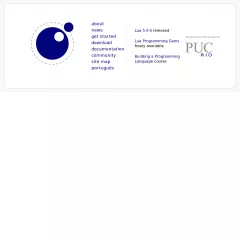Lua 
Lua is used by 6.71% of sites
Official Website
http://www.lua.orgCategory
Programming Languages
Lua is a lightweight, high-level scripting language designed for embedded systems, extensibility, and general-purpose programming. It was created by a team of researchers at the Pontifical Catholic University of Rio de Janeiro (PUC-Rio) in Brazil and first released in 1993. Lua has gained popularity due to its simplicity, efficiency, and ease of integration into other applications.
Key features and characteristics of Lua include:
Lightweight and Fast: Lua is a lightweight language with a small runtime footprint. It is designed to be fast and efficient, making it suitable for performance-critical applications and embedded systems.
Embeddability: One of the main strengths of Lua is its ability to be easily embedded into other applications or systems. It provides a simple C API for integrating Lua into existing software, allowing developers to extend functionality or provide scripting capabilities to their applications.
Dynamic Typing: Lua uses dynamic typing, meaning variable types are determined at runtime rather than compile-time. This flexibility allows for more dynamic programming and makes Lua code concise and expressive.
Scripting Language: Lua is primarily known as a scripting language. It provides features such as dynamic data structures, automatic memory management, and a range of built-in libraries that simplify common scripting tasks.
Extensibility: Lua is highly extensible, allowing developers to create custom modules and libraries in C that can be seamlessly integrated into Lua programs. This extensibility enables developers to add functionality or optimize performance by writing critical code in a lower-level language.
Table-based Data Structure: Lua's table data structure is a key feature that provides powerful associative arrays and can be used for various purposes, including arrays, lists, records, and objects. Tables are the primary data structure in Lua and are versatile and efficient.
Portability: Lua is highly portable and runs on various platforms, including Windows, macOS, Linux, iOS, Android, and many others. This portability allows developers to write Lua code once and deploy it across different systems without significant modifications.
Community and Ecosystem: Lua has an active and supportive community of developers who contribute to its development, create libraries, and provide resources and support. The Lua ecosystem offers a wide range of third-party libraries and frameworks that extend the language's capabilities.
Applications: Lua is used in a wide range of applications and industries, including game development, embedded systems, scripting for software and applications, configuration files, network programming, and more. Notably, Lua is the scripting language of choice for popular game engines like Unity and Corona SDK.
Lua's simplicity, efficiency, and flexibility make it a popular choice for developers looking for a lightweight and embeddable scripting language. Its ease of use, extensibility, and active community support contribute to its growing adoption in various domains.
Key features and characteristics of Lua include:
Lightweight and Fast: Lua is a lightweight language with a small runtime footprint. It is designed to be fast and efficient, making it suitable for performance-critical applications and embedded systems.
Embeddability: One of the main strengths of Lua is its ability to be easily embedded into other applications or systems. It provides a simple C API for integrating Lua into existing software, allowing developers to extend functionality or provide scripting capabilities to their applications.
Dynamic Typing: Lua uses dynamic typing, meaning variable types are determined at runtime rather than compile-time. This flexibility allows for more dynamic programming and makes Lua code concise and expressive.
Scripting Language: Lua is primarily known as a scripting language. It provides features such as dynamic data structures, automatic memory management, and a range of built-in libraries that simplify common scripting tasks.
Extensibility: Lua is highly extensible, allowing developers to create custom modules and libraries in C that can be seamlessly integrated into Lua programs. This extensibility enables developers to add functionality or optimize performance by writing critical code in a lower-level language.
Table-based Data Structure: Lua's table data structure is a key feature that provides powerful associative arrays and can be used for various purposes, including arrays, lists, records, and objects. Tables are the primary data structure in Lua and are versatile and efficient.
Portability: Lua is highly portable and runs on various platforms, including Windows, macOS, Linux, iOS, Android, and many others. This portability allows developers to write Lua code once and deploy it across different systems without significant modifications.
Community and Ecosystem: Lua has an active and supportive community of developers who contribute to its development, create libraries, and provide resources and support. The Lua ecosystem offers a wide range of third-party libraries and frameworks that extend the language's capabilities.
Applications: Lua is used in a wide range of applications and industries, including game development, embedded systems, scripting for software and applications, configuration files, network programming, and more. Notably, Lua is the scripting language of choice for popular game engines like Unity and Corona SDK.
Lua's simplicity, efficiency, and flexibility make it a popular choice for developers looking for a lightweight and embeddable scripting language. Its ease of use, extensibility, and active community support contribute to its growing adoption in various domains.